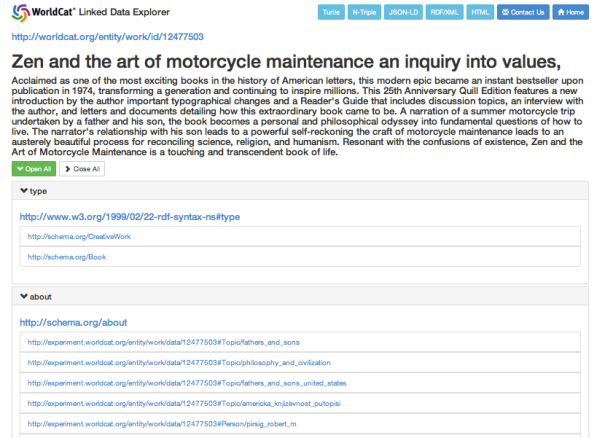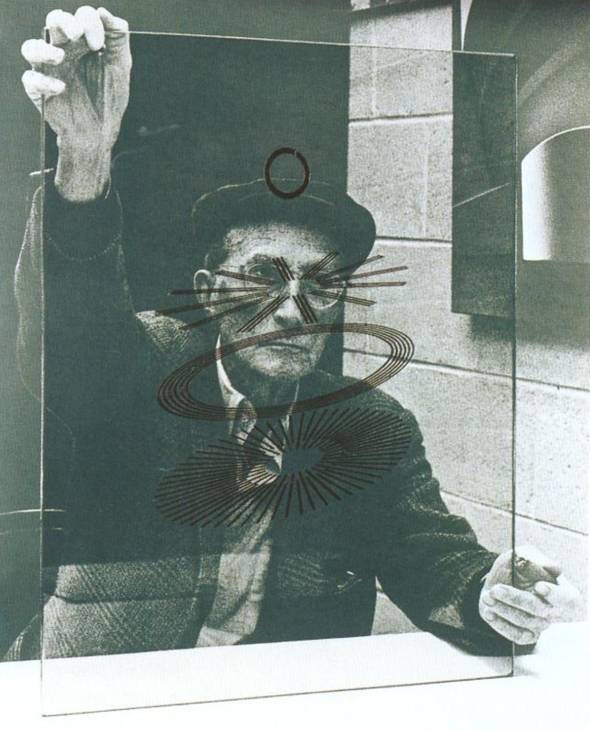 Today in Cape Town, South Africa, at the OCLC Europe, Middle East and Africa Regional Council (EMEARC) Meeting, my colleagues Richard Wallis and Ted Fons made an announcement that should make all library coders and data geeks leap to their feet. I certainly did, and I work here. However, viewed from our perspective this is simply another step along a road that we set out on some time ago. More on that later, but first to the big news:
Today in Cape Town, South Africa, at the OCLC Europe, Middle East and Africa Regional Council (EMEARC) Meeting, my colleagues Richard Wallis and Ted Fons made an announcement that should make all library coders and data geeks leap to their feet. I certainly did, and I work here. However, viewed from our perspective this is simply another step along a road that we set out on some time ago. More on that later, but first to the big news:
- We have established “work records” for bibliographic records in WorldCat, which bring together the sometimes numerous manifestations of a work into one logical entity.
- We are exposing these records as linked open data on the web, with permanent identifiers that can be used by other linked data aggregations.
- We have provided a human readable interface to these records, to enable and encourage understanding and use of this data.
Let me dive into these one by one, although the link above to Richard’s post also has some great explanations.
One of the issues we have as librarians is to somehow relate all the various printings of a work. Think of Treasure Island, for example. Can you imagine how many times that has been published? It hardly seems helpful, from an end-user perspective, to display screen upon screen of different versions of the same work. Therefore, identifying which works are related can have a tremendous beneficial impact on the end user experience. We have now done that important work.
But we also want to enable others to use these associations in powerful new ways by exposing the data as linked (and linkable) open data on the web. To do this, we are exposing a variety of serializations of this data: Turtle, N-Triple, JSON-LD, RDF/XML, and HTML. When looking at the data, please keep in mind that this is an evolutionary process. There are possible linkages not yet enabled in the data that will be later. See Richard’s blog post for more information on this. The license that applies to this is the Open Data Commons Attribution license, or ODC-BY.
Although it is expected that the true use of this data will be by software applications and other linked data aggregations, we also believe it is important for humans to be able to see the data in an easy-to-understand way. Thus we are providing the data through a Linked Data Explorer interface. You will likely be wondering how you can obtain a work ID for a specific item, which Richard explains:
How do I get a work id for my resources? – Today, there is one way. If you use the OCLC xISBN, xOCLCNum web services you will find as part of the data returned a work id (eg. owi=”owi12477503”). By striping off the ‘owi’ you can easily create the relevant work URI:http://worldcat.org/entity/work/id/12477503
In a very few weeks, once the next update to the WorldCat linked data has been processed, you will find that links to works will be embedded in the already published linked data. For example you will find the following in the data for OCLC number 53474380:
schema:exampleOfWorkhttp://worldcat.org/entity/work/id/12477503
As you can see, although today is a major milestone in our work to make the WorldCat data aggregation more useful and usable to libraries and others around the world, there is more to come. We have more work to do to make it as usable as we want it to be and we fully expect there will be things we will need to fix or change along the way. And we want you to tell us what those things are. But today is a big day in our ongoing journey to a future of actionable data on the web for all to use.

